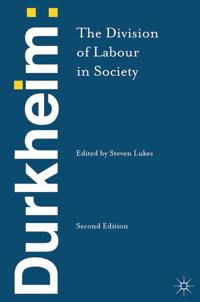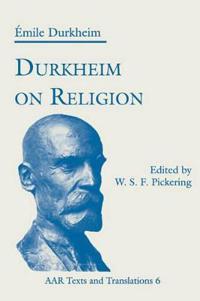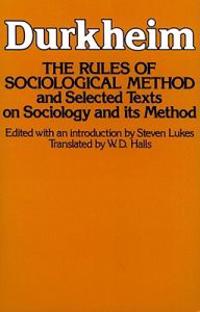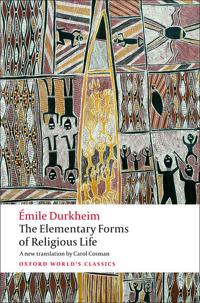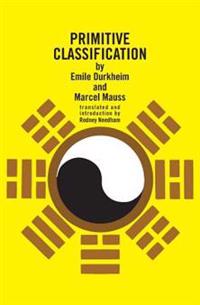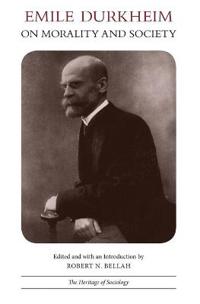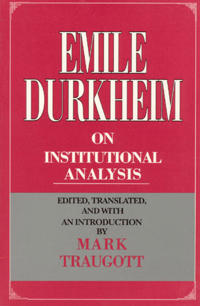Durkheim: The Division of Labour in Society (Häftad)
avEmile Durkheim
ISBN: 9781137031822 - UTGIVEN: 2013-10Arguably sociology's first classic and one of Durkheim's major works, The Division of Labour in Society studies the nature of social solidarity, exploring the ties that bind one person to the next so as to hold society together in conditions of modernity. In this revised and updated second edition, [...]
Durkheim: The Division of Labour in Society (Inbunden)
avEmile Durkheim
ISBN: 9781137347138 - UTGIVEN: 2013-10-25Durkheim: The Division of Labour in Society (e-bok)
avEmile Durkheim
ISBN: 9781137347411Arguably sociology's first classic and one of Durkheim's major works, The Division of Labour in Society studies the nature of social solidarity, exploring the ties that bind one person to the next so as to hold society together in conditions of modernity. In this revised and updated second edition[...]
Durkheim on Religion (Häftad)
avEmile Durkheim, W. S. F. Pickering
ISBN: 9781555409814 - UTGIVEN: 1994-01This volume brings together a comprehensive selection of mile Durkheim's writings on religion. Besides helping to establish the discipline of sociology in France, Durkheim is widely recognized as one of the founding figures in the modern study of religion. Included are important sections of The Elem[...]
The Elementary Forms of Religious Life (Pocket)
avEmile Durkheim, Karen E. Fields, Emile Durkheim
ISBN: 9780029079379 - UTGIVEN: 199509"Karen Fields has given us a splendid new translation of the greatest work of sociology ever written, one we will not be embarrassed to assign to our students. In addition she has written a brilliant and profound introduction. The publication of this translation is an occasion for general celebratio[...]
Educacion y sociologia / Education and Sociology (Pocket)
avEmile Durkheim, Oriol Homs, Emile Durkheim
ISBN: 9788478844142 - UTGIVEN: 200905The Rules of Sociological Methods (Häftad)
avEmile Durkheim
ISBN: 9780029079409 - UTGIVEN: 198212First published in 1895: Emile Durkheim's masterful work on the nature and scope of sociology--now with a new introduction and improved translation by leading scholar Steven Lukes."The Rules of the Sociological Method" is among the most important contributions to the field of sociology, still debate[...]
On Suicide (Storpocket)
avEmile Durkheim
ISBN: 9780140449679 - UTGIVEN: 200609Emile Durkheim's "On Suicide" (1897) was a groundbreaking book in the field of sociology. Traditionally, suicide was thought to be a matter of purely individual despair but Durkheim recognized that the phenomenon had a social dimension. He believed that if anything can explain how individuals relate[...]
The Elementary Forms of Religious Life (Pocket)
avEmile Durkheim, Carol Cosman, Mark S. Cladis
ISBN: 9780199540129 - UTGIVEN: 200806'If religion generated everything that is essential in society, this is because the idea of society is the soul of religion.' In The Elementary Forms of Religious Life (1912), Emile Durkheim set himself the task of discovering the enduring source of human social identity. He investigated what he co[...]
Primitive Classification (Häftad)
avEmile Durkheim
ISBN: 9780226173344 - UTGIVEN: 196709Emile Durkheim and Marcel Mauss maintain that society is the source of the very categories of human thought. First published in the "Annee Sociologique in 1903, this classic essay has been translated by Rodney Needham, who also provides a critical introduction.
"["Primitive Classification] will [...]On Morality and Society (Häftad)
avEmile Durkheim
ISBN: 9780226173368 - UTGIVEN: 197502Selections from Durkheim's writings focus on the nature of his conception of society and its moral context[...]
On Institutional Analysis (Häftad)
avEmile Durkheim
ISBN: 9780226173719 - UTGIVEN: 199407Ranging from Durkheim's original lecture in sociology to an excerpt from the work incomplete at his death, these selections illuminate his multiple approaches to the crucial concept of social solidarity and the study of institutions as diverse as the law, morality, and the family. Durkheim's focus o[...]
The Rules Of Sociological Method (Pocket)
avEmile Durkheim
ISBN: 9780333280720 - UTGIVEN: 1982-11-25Suicide (Pocket)
avEmile Durkheim
ISBN: 9780415278317 - UTGIVEN: 2002-02-21Originally published in 1897, this is Durkheim's pioneering attempt to offer a sociological explanation for a phenomenon regarded until then as exclusively psychological and individualistic.[...]
Emile Durkheim (häftad)
ISBN: 9780415285315 - UTGIVEN: 2002-11This book examines Durkheim's considerable achievements and situates them in their social and intellectual contexts, with a concise account of the major elements of Durkheim's sociology. The book includes a critical commentary on the four main studies which exemplify Durkheim's contribution to socio[...]
Sociology And Philosophy (Inbunden)
avEmile Durkheim
ISBN: 9780415557702 - UTGIVEN: 2009-10-14First published in English in 1953, this volume represents a collection of three essays written by seminal sociologist and philsopher Emile Durkheim in which he puts forward the thesis that society is both a dynamic system and the seat of moral life. Each essay stands alone, but their connecting thr[...]
The Evolution of Educational Thought (Häftad)
avEmile Durkheim
ISBN: 9780415569064 - UTGIVEN: 200911Emile Durkheim
ISBN: 9780415756259 - UTGIVEN: 2015-09International scholarship over the last twenty years has produced a new understanding of Emile Durkheim as a thinker. It has contributed to reassembling what, for Durkheim, was always a whole: a sociological selection on morals and moral activism. This volume presents an overview of Durkheim's thoug[...]
Emile Durkheim: Sociologist of Modernity (Övrig)
avEditor: Mustafa Emirbayer
ISBN: 9780470756133 - UTGIVEN: 2008-04-30Moral Education (Pocket)
avEmile Durkheim, Everett K. Wilson, Herman Schnurer
ISBN: 9780486424989 - UTGIVEN: 200212The Elementary Forms Of The Religious Life (Pocket)
avEmile Durkheim
ISBN: 9780486454566 - UTGIVEN: 200804Emile Durkheim: Selected Writings (Häftad)
ISBN: 9780521097123 - UTGIVEN: 1972-06This is the only collection of Durkheim?s writings to draw upon the whole body of his work. Many of the texts in the book are here translated for the first time. Dr Giddens takes his selections from a wide variety of sources and includes a number of items from untranslated writings in the Revue Phil[...]
Emile Durkheim: Sociologist of Modernity (Häftad)
avMustafa Emirbayer, Ira J. Cohen
ISBN: 9780631219910 - UTGIVEN: 2003-02Often described as 'the father of sociology', Emile Durkheim ranks among the most important and influential figures in modern social thought. This volume captures the enduring value and importance of Durkheimian sociology, focusing on the diverse points of view - theoretical, substantive, methodolog[...]
Suicide (Häftad)
avEmile Durkheim
ISBN: 9780684836324 - UTGIVEN: 1997-02A classic book about the phenomenon of suicide and its social causes written by one of the world's most influential sociologists. Emile Durkheim's "Suicide "addresses the phenomenon of suicide and its social causes. Written by one of the world's most influential sociologists, this classic argues tha[...]

